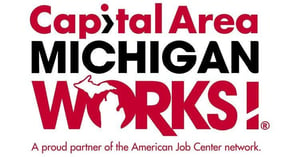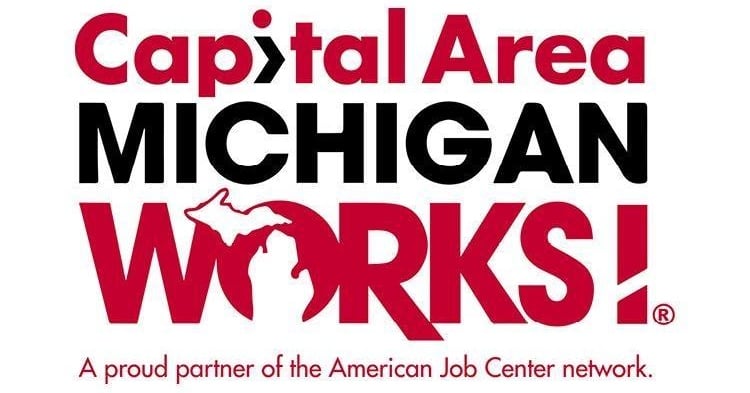
Chris Holman welcomes back Carrie Rosingana, , CEO, CAMW! Capital Area Michigan Works!, Lansing, MI, but serving Ingham, Eaton and Clinton Counties.
Watch Carrie and Chris discuss discusses the Capital Area Child Care Coalition's roundtable on supporting employees' child care needs to enhance workforce retention in the YouTube video shared below:
What is the Capital Area Child Care Coalition and what was discussed at the recent roundtable event?
● At the Employer Roundtable we addressed the impact of child care on the capital area region’s workforce. Our goal is to grow the Lansing region as one of the most innovative and prosperous communities in the country and ensure families have the support and resources they need to care for their families while entering or maintaining their position in the workforce. ● We not only reviewed the importance of accessible quality child care for economic prosperity and employment retainment, but we also covered strategies to support employees in overcoming child care barriers.
● The roundtable allowed employers and community leaders to gather together and brainstorm solutions to child care barriers that would transform challenges into opportunities for the capital area.
○ Collaborations between businesses, government and nonprofits can create effective child care programs, benefiting the entire community. Carrie, feel free to add any additional thoughts and information about why this topic is important to you.
Question: How are child care disparities affecting the workforce today and why is it important to address?
● Unaffordable and non-available child care causes a decrease in employment retainment, increased stress on working parents and decreased workforce efficiency.
○ According to Michigan Advance, of the Michigan households who reported child care issues in 2024, 36% have cut work hours, 34% have taken unpaid leave, 31% have had to supervise their children while working and 26% have left a job due to child care disruptions.
○ Additionally, households with children under 12 that reported child care arrangement issues over the past four weeks climbed from 19.6% to 22.3% from fall 2023 to spring 2024.
● We are also seeing a mental health crisis impacting working mothers nationwide. According to reports in Talkspace, 66% of working moms say they’re not mentally healthy and 93% report feeling burned out.
○ Struggles listed by working mothers include:
■ Limited or no flexibility in scheduling.
■ Inadequate maternity leave and postpartum support.
■ Little compassion from leadership and coworkers.
■ Lack of child care options.
● In many cases, one parent is forced to stay home for extended periods of time to watch their children because there are no alternatives. Other times, families cannot afford to stop working and must financially strain in order to maintain child care.
● It is important to address child care disparities in order to support families and grow happier and more productive working communities.
○ As mentioned in Chalkbeat Detroit, the estimated number of day care “slots” for Michigan’s children aged 0 to 5 years old is around 264,000. Michigan has more than 559,000 children under the age of 5.
● Child care as a profession is on the decline due to unsustainably low wages.
○ According to Michigan League for Public Policy, the younger the child, the lower the pay for early educators; Michigan child care teachers with bachelor’s degrees are being paid 22% less than their colleagues in the K-8 system.
○ Low wages in child care has resulted in staffing turnover rates as high as 25 to 30%, affecting the quality of care for infants and toddlers.
● Child care is a huge financial burden for many families and oftentimes families are unable to afford child care at all.
○ Studies conducted by Tootris show that for infants in Michigan, the average annual cost of care is $10,861, which is about $905 per month.
○ For 4-year-olds in Michigan, child care costs an average of $8,890 annually, which is about $741 per month.
○ In her 2025 budget proposal, Gov. Whitmer asked lawmakers to approve $159 million to make this vision a reality in the next fiscal year.
○ The share of women who wanted to work but couldn’t because they were caring for a young child went down in the states providing significant childcare funding, dropping from 45.3% to 31.9% according to Michigan Advance.
● Michigan is looking to implement and support multiple child care initiatives this year including the Tri-Share Child Care Initiative and the Caring for MI Future effort.
○ The Tri-Share Child Care Initiative is a new proposal that will allow families the opportunity to split the cost of child care between the parents, their employers and the government in equal-thirds.
○ Caring for MI Future is a statewide effort to help child care entrepreneurs open 1,000 new or expanded child care centers by the end of 2024.
■ This initiative focuses on helping entrepreneurs with finding and renovating space, startup funding, recruiting staff and creating a business plan.
○ Additionally, the state of Michigan is looking to increase the supply of child care in northern Michigan, specifically by increasing the wages and the competitiveness of the child care industry as a job. Source
Question: How can people learn more about the Capital Area Child Care Coalition?
● If you are interested in joining the Coalition, you can submit a membership application at puremichigan.com/childcare/join.
For more details on this topic:
Event Unites Employers and Community Leaders to Foster Workforce Engagement and Economic Growth in the Tri-County Region
LANSING, Mich. (June 20, 2024) — The Capital Area Child Care Coalition (CACCC) is pleased to announce an Employer Roundtable, a crucial event aimed at addressing the impact of childcare on the regional workforce. The event will take place on Thursday, June 20 {at this hour} at the University Club of MSU in Lansing. The CACCC is co-led by the Lansing Economic Area Partnership (LEAP), Capital Area Michigan Works! (CAMW!) and the United Way of South Central Michigan (UWSCMI).
As a group of community leaders in Clinton, Eaton and Ingham Counties, the CACCC is dedicated to increasing the supply of high-quality childcare in the region. Their efforts have been recognized through the regional childcare coalition grant awarded by the Early Childhood Investment Corporation’s (ECIC) Child Care Innovation Fund as part of the Caring for MI Future initiative. The coalition since being awarded has conducted research, including cataloging existing providers, surveying providers, and conducting parent focus groups, that help the coalition make data-driven decisions, including a Regional Action Plan underway.
 “If we do this right together as a region, we will continue to grow the Lansing region as one of the most innovative, prosperous and competitive communities in America.” said Bob Trezise, president and CEO of LEAP (left).
“If we do this right together as a region, we will continue to grow the Lansing region as one of the most innovative, prosperous and competitive communities in America.” said Bob Trezise, president and CEO of LEAP (left).
The Employer Roundtable aims to bring together regional employers, human resource professionals, and C-suite leaders to discuss the impact of childcare on employees and businesses. The event will provide valuable insights into the importance of quality childcare for economic prosperity and talent development. Attendees will also learn about strategies to support employees in overcoming childcare barriers, ultimately enhancing workforce engagement across sectors.
 Carrie Rosingana, CEO of CAMW! (left), expressed her pride in partnering with and supporting the CACCC. She emphasized the critical role of quality child care in supporting families across all industry sectors and acknowledged the challenges it poses for individuals seeking and maintaining employment successfully.
Carrie Rosingana, CEO of CAMW! (left), expressed her pride in partnering with and supporting the CACCC. She emphasized the critical role of quality child care in supporting families across all industry sectors and acknowledged the challenges it poses for individuals seeking and maintaining employment successfully.
"Having access to quality child care is critical to supporting families that work across all industry sectors and is often a barrier that impacts an individual's ability to gain and retain employment successfully," said Rosingana.
The Employer Roundtable will feature an informational roundtable session from 3:00 to 4:30 p.m., followed by an optional networking hour from 4:30 to 5:30 p.m. in part sponsored by PNC Bank. The event will take place at the Lower-Level Ballroom of the University Club of MSU, located at 3435 Forest Road, Lansing, MI 48910.
 Chaz Carrillo, a co-chair of Greater Lansing Hispanic Chamber of Commerce (left), highlighted the economic significance of addressing child care challenges. He emphasized that practical solutions in this area would drive economic growth across industries, benefiting both individuals and employers.
Chaz Carrillo, a co-chair of Greater Lansing Hispanic Chamber of Commerce (left), highlighted the economic significance of addressing child care challenges. He emphasized that practical solutions in this area would drive economic growth across industries, benefiting both individuals and employers.
"Childcare is a crucial component of our economy. Practical solutions to this issue will drive economic growth across industries and transform challenges into opportunities for our region, influencing individual economic mobility and employer production," Carrillo stated.
“As a child care provider, supporting child care aligns with Corporate Social Responsibility goals, enhances corporate reputation, and increases employee satisfaction and retention. Collaborations between businesses, government, and non-profits can create effective child care programs, benefiting the entire community,” said Santrece Roberts, owner of Caterpillar Corner Child Care.
For more information and to register for the Employer Roundtable, please visit LEAP’s website at www.purelansing.com/childcare.
###
About LEAP
The Lansing Economic Area Partnership (LEAP) is a coalition of area leaders partnering to build a stronger community for all — working every day to grow, retain and attract business to the Lansing, Michigan, region
» Visit MBN website: www.michiganbusinessnetwork.com/
» Subscribe to MBN’s YouTube: www.youtube.com/channel/UCqNX…
» Like MBN: www.facebook.com/mibiznetwork
» Follow MBN: twitter.com/MIBizNetwork/
» MBN Instagram: www.instagram.com/mibiznetwork/

















